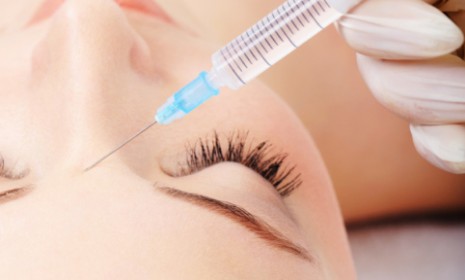Can Botox help treat depression?
The increasingly popular wrinkle-reducing muscle relaxant hampers your ability to to convey emotion. That could be a good thing if you're feeling blue

A free daily email with the biggest news stories of the day – and the best features from TheWeek.com
You are now subscribed
Your newsletter sign-up was successful
It's a common complaint among Botox patients and those who interact with them: The wrinkle-zapping injection dulls a person's ability to convey emotion through facial expressions. Sure, this can be bad news for interpersonal relationships — but it may actually be an asset for battling depression, according to a new study. Here's what you should know:
How was this study conducted?
Researchers selected 30 participants suffering from major depression. Half were given five injections of Botox between and just above the eyebrows while the other half were given placebo injections in the same places. After six weeks, health care professionals ranked the patients' depressive symptoms — including sullen mood, insomnia, and weight loss — and reported back to researchers.
The Week
Escape your echo chamber. Get the facts behind the news, plus analysis from multiple perspectives.

Sign up for The Week's Free Newsletters
From our morning news briefing to a weekly Good News Newsletter, get the best of The Week delivered directly to your inbox.
From our morning news briefing to a weekly Good News Newsletter, get the best of The Week delivered directly to your inbox.
What did researchers find?
Patients who were injected with the placebo had a 9 percent reduction in depressive symptoms, while patients injected with Botox had a 47 percent decrease in symptoms. Such mood elevations held steady throughout the rest of the 16-week study period for both groups.
Why is this?
We already know that muscles in your face communicate your emotions to other people. But this study suggests that these facial muscles are also instrumental in regulating your own mood. How? The study's author, M. Axel Wollmer, a psychiatrist from Switzerland's University of Basel, posits that Botox helps block negative feedback "from the facial musculature to the brain, which may be involved in the development and maintenance of negative emotions." Essentially, your facial muscles might not just tell other people how you feel — they might tell your brain how you feel, too. And because Botox relaxes those muscles, it may prevent your face from telling your brain that you're blue.
A free daily email with the biggest news stories of the day – and the best features from TheWeek.com
Sources: Jezebel, Medical Daily, Scientific American
-
 The environmental cost of GLP-1s
The environmental cost of GLP-1sThe explainer Producing the drugs is a dirty process
-
 Nuuk becomes ground zero for Greenland’s diplomatic straits
Nuuk becomes ground zero for Greenland’s diplomatic straitsIN THE SPOTLIGHT A flurry of new consular activity in the remote Danish protectorate shows how important Greenland has become to Europeans’ anxiety about American imperialism
-
 ‘This is something that happens all too often’
‘This is something that happens all too often’Instant Opinion Opinion, comment and editorials of the day